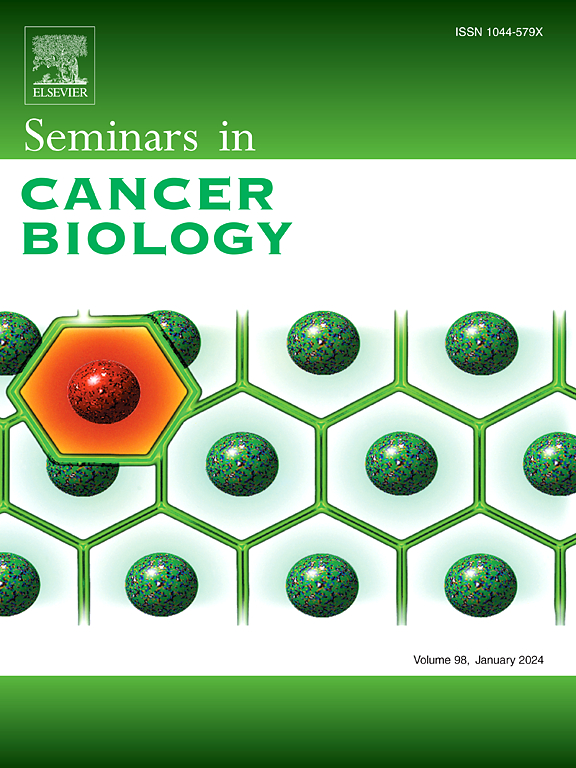免疫衰老在非小细胞肺癌(NSCLC)治疗中的作用机制与策略:综合分析及未来发展方向
IF 12.1
1区 医学
Q1 ONCOLOGY
引用次数: 0
摘要
非小细胞肺癌(NSCLC)是最常见的肺癌形式,仍然是世界范围内癌症相关死亡的主要原因,特别是在老年人中。免疫衰老现象,以免疫细胞功能随着年龄的增长而逐渐下降为特征,在非小细胞肺癌的进展中起着关键作用,并导致老年患者治疗干预的效果下降。免疫衰老表现为免疫监视受损,细胞毒性反应减少,慢性炎症增加,共同形成促肿瘤微环境。本文综述了非小细胞肺癌中免疫衰老的分子、细胞和遗传机制及其对免疫监测和肿瘤微环境(TME)的影响。我们探讨衰老如何影响各种免疫细胞,包括T细胞、B细胞、NK细胞和巨噬细胞,以及这些变化如何损害免疫系统检测和消除肿瘤细胞的能力。此外,我们解决了免疫衰老对当前治疗策略的挑战,特别是免疫疗法,由于免疫功能障碍,老年患者面临重大障碍。该综述强调了新兴技术,如单细胞测序和CRISPR-Cas9,它们为免疫衰老及其作为治疗靶点的潜力提供了新的见解。最后,我们概述了未来的研究方向,包括恢复衰老免疫系统的策略和优化老年NSCLC患者的免疫治疗,以提高治疗效果和生存结果。这些努力有望为老年非小细胞肺癌患者开发更有效、个性化的治疗方法。本文章由计算机程序翻译,如有差异,请以英文原文为准。
Mechanisms and strategies of immunosenescence effects on non-small cell lung cancer (NSCLC) treatment: A comprehensive analysis and future directions
Non-small cell lung cancer (NSCLC), the most prevalent form of lung cancer, remains a leading cause of cancer-related mortality worldwide, particularly among elderly individuals. The phenomenon of immunosenescence, characterized by the progressive decline in immune cell functionality with aging, plays a pivotal role in NSCLC progression and contributes to the diminished efficacy of therapeutic interventions in older patients. Immunosenescence manifests through impaired immune surveillance, reduced cytotoxic responses, and increased chronic inflammation, collectively fostering a pro-tumorigenic microenvironment. This review provides a comprehensive analysis of the molecular, cellular, and genetic mechanisms of immunosenescence and its impact on immune surveillance and the tumor microenvironment (TME) in NSCLC. We explore how aging affects various immune cells, including T cells, B cells, NK cells, and macrophages, and how these changes compromise the immune system’s ability to detect and eliminate tumor cells. Furthermore, we address the challenges posed by immunosenescence to current therapeutic strategies, particularly immunotherapy, which faces significant hurdles in elderly patients due to immune dysfunction. The review highlights emerging technologies, such as single-cell sequencing and CRISPR-Cas9, which offer new insights into immunosenescence and its potential as a therapeutic target. Finally, we outline future research directions, including strategies for rejuvenating the aging immune system and optimizing immunotherapy for older NSCLC patients, with the goal of improving treatment efficacy and survival outcomes. These efforts hold promise for the development of more effective, personalized therapies for elderly patients with NSCLC.
求助全文
通过发布文献求助,成功后即可免费获取论文全文。
去求助
来源期刊

Seminars in cancer biology
医学-肿瘤学
CiteScore
26.80
自引率
4.10%
发文量
347
审稿时长
15.1 weeks
期刊介绍:
Seminars in Cancer Biology (YSCBI) is a specialized review journal that focuses on the field of molecular oncology. Its primary objective is to keep scientists up-to-date with the latest developments in this field.
The journal adopts a thematic approach, dedicating each issue to an important topic of interest to cancer biologists. These topics cover a range of research areas, including the underlying genetic and molecular causes of cellular transformation and cancer, as well as the molecular basis of potential therapies.
To ensure the highest quality and expertise, every issue is supervised by a guest editor or editors who are internationally recognized experts in the respective field. Each issue features approximately eight to twelve authoritative invited reviews that cover various aspects of the chosen subject area.
The ultimate goal of each issue of YSCBI is to offer a cohesive, easily comprehensible, and engaging overview of the selected topic. The journal strives to provide scientists with a coordinated and lively examination of the latest developments in the field of molecular oncology.
 求助内容:
求助内容: 应助结果提醒方式:
应助结果提醒方式:


